Transitioning to Triathlon: What Every Runner Needs to Know
If you love to run and know you can at least float in the water and ride a bike without training wheels, the idea of participating in your first triathlon may have crossed your mind once or twice. The sport of triathlon is growing by leaps and bounds. The #1 reason people say they participate is because they want a personal challenge (according to USA Triathlon).
I’m one of those people who helps make that statistic true.
I participated in my first triathlon back in 2006. I was lucky to have a coworker who showed me the ropes – what equipment I needed to have, how to set up my transition area, what to expect on race day, etc. I borrowed a tragically slow mountain bike (gasp!) to use for the race and don’t think I shifted gears once. The only real thing I knew about swimming at the time was how not to drown. But like most triathletes, I had the running thing down.
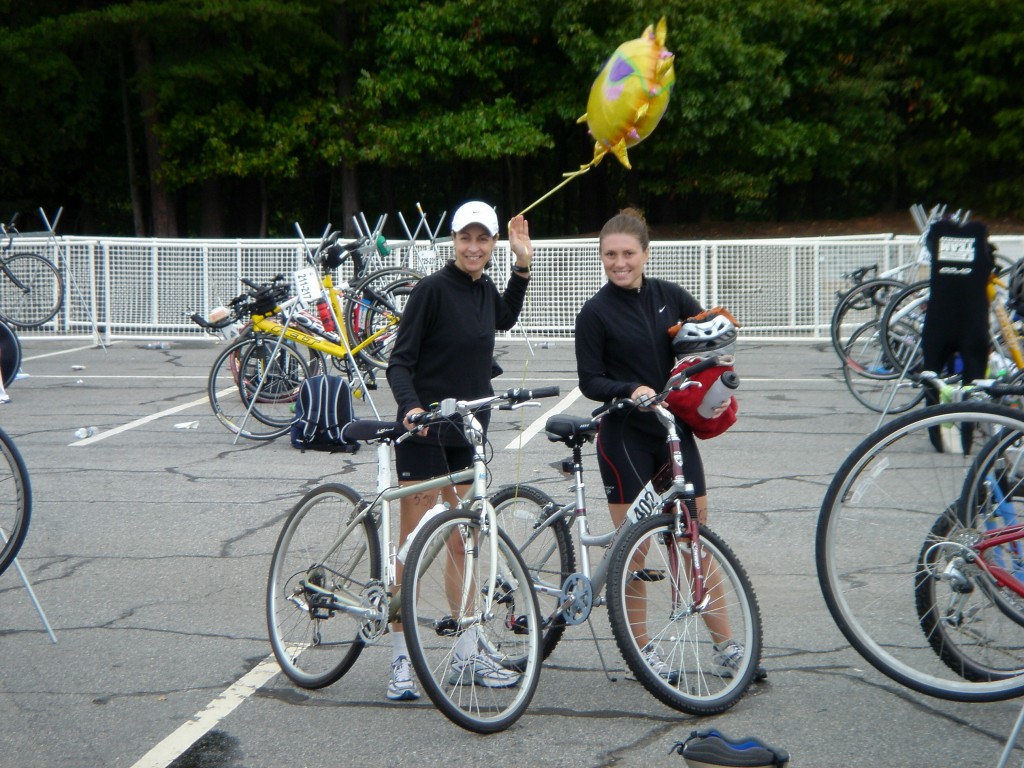
15 triathlons and hundreds of hours of training later, I’ve come a long way from that first triathlon.
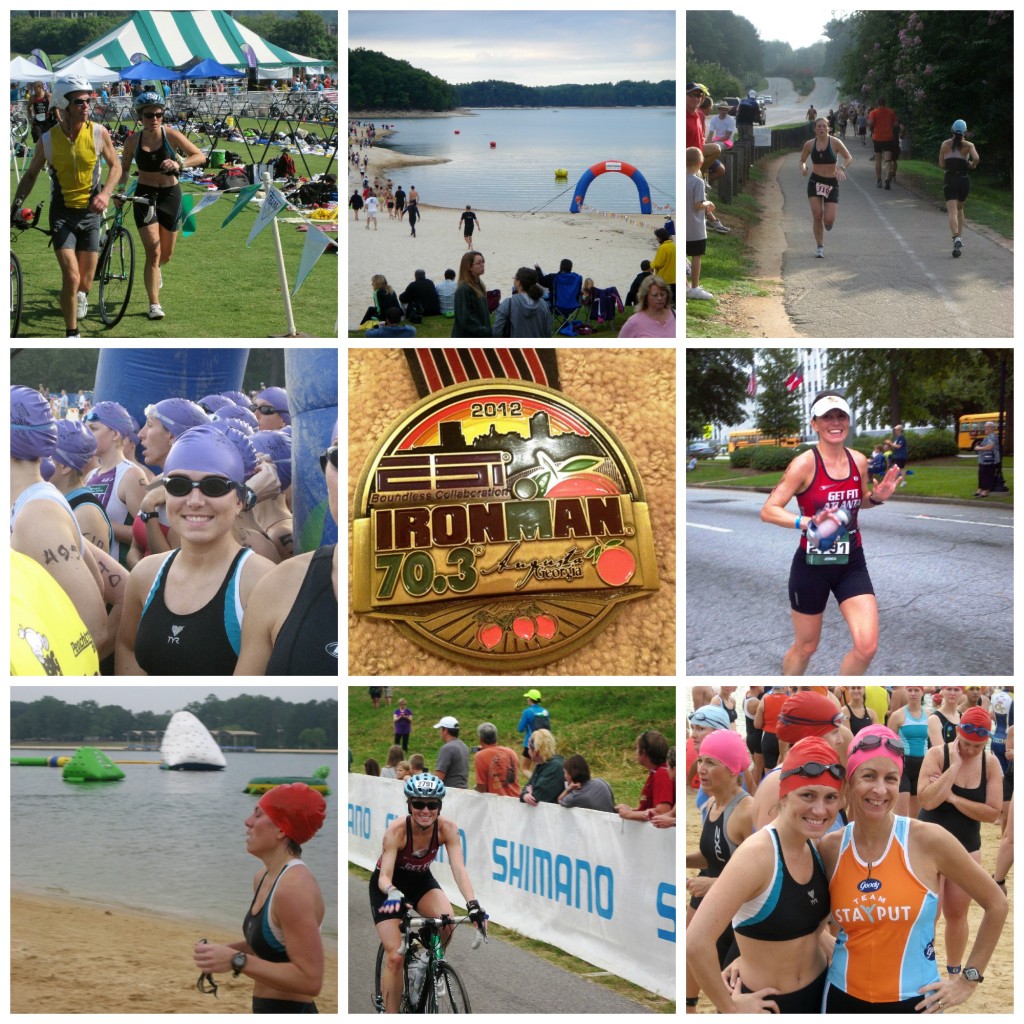
As my half Ironman training is in full swing this season, you’ll be hearing me talk about more than just running for the next few months. I’ve already heard from many of you who you are interested in doing your first triathlon (high five, good for you!). For all you runners out there who are thinking about training for your first triathlon, here are some basics you need to know …
- Find a friend who knows what they’re doing and become a sponge. The best way to learn more about what it’s like to train for and participate in a triathlon is to learn from someone who has already done it. Find a neighbor, coworker or training partner who will be willing to talk to you about the sport, share guidance and advice, show you how a transition area works, etc. Ideally, this will be someone who has already done the race you are thinking about and can tell you step by step what it’s like. Consider joining a local training group/club with more experienced triathletes who you can learn from, too. I don’t know how I would have been able to do my first triathlon without my experienced coworker and her husband guiding me along.
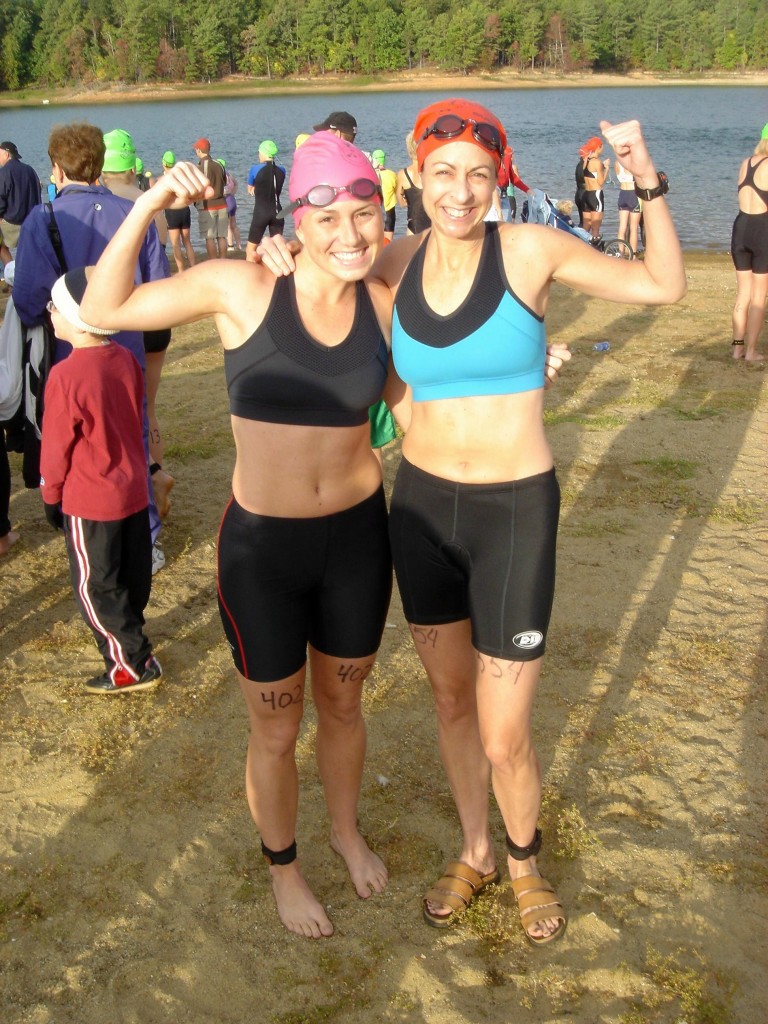
- Start with a sprint. It always amazes me when I hear from people who are doing a full Ironman as their first triathlon. While I give them major props, I think that can be overwhelming and stressful. The best way to get some experience under your belt and to find out if triathlon is something you’re really interested in is to start small. Just like you have to be able to run 3 miles before you can run a marathon, I recommend starting with a sprint triathlon before you consider a longer distance. There are some great beginner sprint tri plans in Triathlete Magazine’s Essential Week-by-Week Training Guide.
- Be prepared to spend some money. When it comes to running, technically you can throw on a pair of shoes and head out your front door to log your miles. With triathlon, there is a lot more equipment involved and many more dollar signs. At a minimum, you will need: a swim suit, goggles, swim cap, road or tri bike, bike helmet, bike gloves, bike shoes if you are using clip pedals, bike shorts, a race belt for your number, tieless shoelaces (such as Yanks), running shoes, Body Glide/TriGlide and a tri suit (top and bottom made for swimming, biking and running). There are so many other gadgets and gear you could have but these are the bare basics. To see my complete triathlon race day packing list, click here.
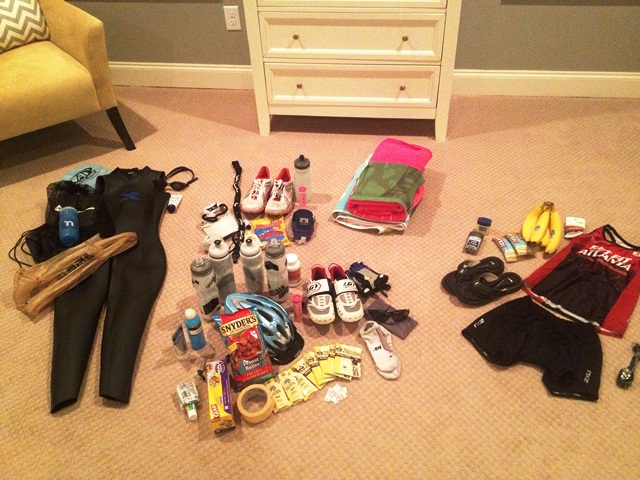
- Use your judgment when it comes to buying a bike. Would you buy a new expensive wardrobe without trying any of the clothes on? Would you accept a new job without knowing where you were going to work or what you’d be asked to do? No. Of course not. The same holds true for triathlon. Don’t go out and buy the most high-end, expensive tri bike until you know triathlons are something you’re going to want to do long-term. You may finish your first race and decide half marathons and marathons are more up your alley. Or, you might do your first triathlon and be ready to conquer a full Ironman. My suggestion would be to start with a mid-range road bike. Go to a local bike specialty shop and get fit for a bike so you know what size you need. Learn more from the knowledgeable staff about what kind of bikes are out there based on your needs. Then, search on Craig’s List and/or through training clubs in your area for used road bikes … or wait until your local store has a good sale. I paid about $800 for my first road bike. Once you get a few races under your belt, you’ll be able to determine if you want to upgrade to a better bike or to a tri bike. I upgraded to an all carbon road bike several years ago, which I still use now. Be prepared to spend several thousand dollars on a good bike. Upgrades to make your bike more aerodynamic (such as aerobars) are good investments.
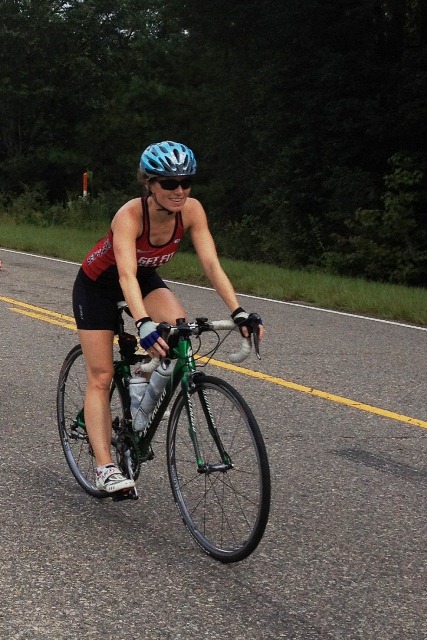
- Your only goal should be to finish. You’ve never done this before. You don’t know what to expect, how your body will respond or what the race will be like. So don’t put a lot of pressure on yourself to beat a certain time. Just go out there with the goal to finish. Have fun. Take in the 3 sports. Decide if you enjoy triathlons. There will be plenty more races for you to set time goals. Your first race doesn’t need to be one of them.
- Do more of what you like least. Most triathletes are strongest in one sport. For most of us, that’s probably running. But you need to focus on the areas where you are weakest to become stronger. For me, that’s the bike. I need to spend more time on the bike because it’s my least favorite of the 3 sports and the area where I have the greatest opportunity for improvement. If you are a lousy swimmer, spend more time in the pool and consider a private lesson or coach. Wondering where to swim? Many local gyms have junior Olympic (25-meter) pools, and many community centers also have pools. Be sure you have access to somewhere you can swim regularly and that the cost fits into your budget before you decide to take the plunge.
- Don’t be afraid of the open water. For most runners who aren’t strong swimmers, swimming is a lot less daunting when you’re in the comfort of your own lane staring down at the straight black line at the bottom of the pool guiding your way. When it comes to triathlon, you will always be racing in a lake, ocean or other body of water where your sight is severely limited underwater and where hundreds of bodies are right beside you. The key is to stay calm. Accept the fact that you are going to get kicked and hit by other swimmers. Know that whatever lives under water is more scared of you than you are of it. I promise it’s not as scary as it seems at first. For tips on how to master the open water swim, click here.
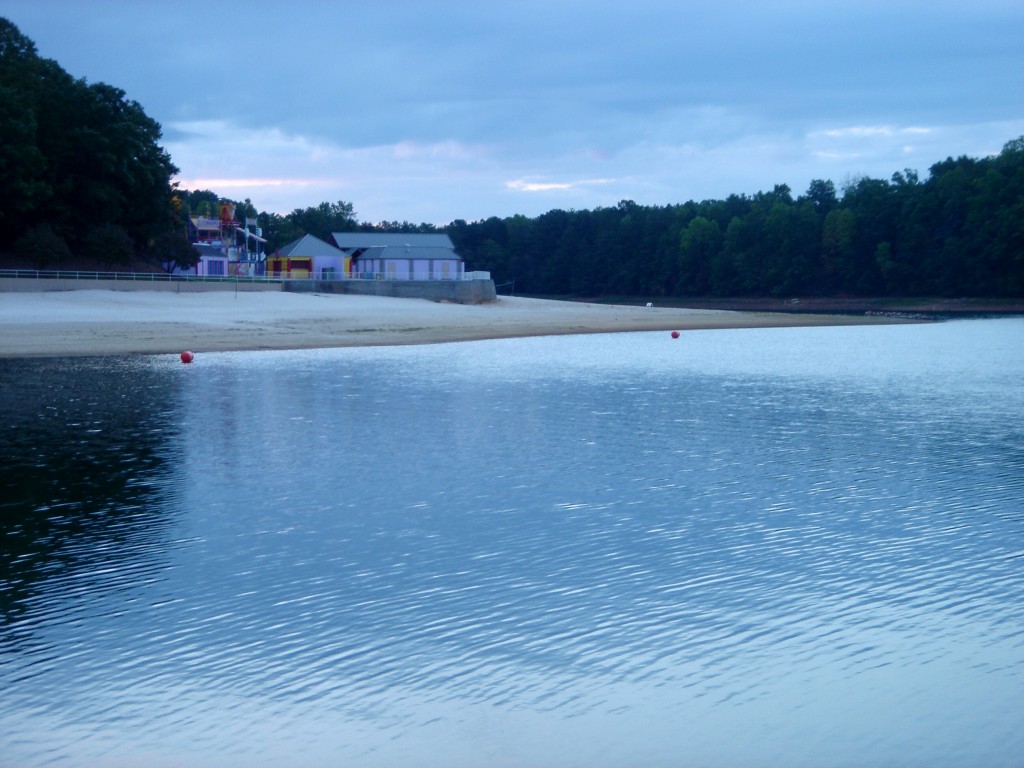
- Minimize the uncertainty. The hardest part about doing your first triathlon is, well, that you’ve never done one before. No matter how prepared you are physically, there is still going to be a level of uncertainty that will only be washed away with experience. What you can do is minimize as much uncertainty as possible. In addition to talking to someone else who has already done the race and learning from them, drive the course to familiarize yourself with each part of the race. Study the transition area the day before the race so you know exactly where to go when you come out of the water. Even practice jogging from the edge of the water to the area where your bike will be. Swim in the lake/ocean before the race so you know what to expect in terms of water temperature and visibility. Run and ride on terrain/elevation that is similar to your race. Doing as much as you can to minimize uncertainty and bring a sense of comfort to yourself on race day will go a long way.
- Half Ironmans are less mentally daunting than running a marathon. Yep. I said it. I was surprised last year that my half Ironman (which took me 5 hours and 46 minutes to complete) was less mentally and physically exhausting than running a marathon in less than 4 hours. Perhaps this is due to the mental break you get from changing from one sport to the next or because you are not bearing all your weight on your legs/feet the entire race … but I was shocked that I was not very sore after the race and I had much more mental strength and positive thoughts than I do during a marathon.
I hope this is a helpful start for those of you who are considering doing your first triathlon. There are so many aspects of the sport that we can and will explore this season. If you have specific questions, please leave a comment below, send me a note on Twitter or Facebook, or email me at runladylike@gmail.com.



Comments
Did my first Tri last year, Fleet Fleet Super Sprint in Chicago. My legs felt like bricks when I started running, but I loved it. This year I will be doing the Chicago Sprint. So, yeah, baby steps for me. Will be training w friends and with Lifetime Fitness during their open water swim clinics. This is my first week of Tri training and i def feel stronger and am having a better start than last year. Your advice is right on, but am def looking at your list of things to have. Wished I had some of those last year
The cost alone keeps me from it but this post is a great help! 😉
Great article, Jes! I can’t even tell you how I studied that email you sent me last summer with tips and tricks, advice, transition etc. I would’ve never been successful (finished!!) without you!! Going back to same event this year and working hard to blow my time out of the water! (pardon the pun 🙂 everyone considering needs to follow your advice on this! You thought of every detail and allowed me to have a BLAST!!!!! Xoxo!!
I am SO SO glad to hear this! I’m so proud of all you’ve accomplished and can’t wait to hear how you do this year! Don’t hesitate to let me know if there is any other support or help I can provide. Go Beth go!
This is great advice…wish I’d had this before my first triathlon last summer! It is interesting to hear that a half ironman was less daunting than a sub 4:00 marathon. That is good to hear, as I definitely am interested in doing a half ironman someday, but am a little frightened because I’m not a big fan of the bike leg! :).
I know you can do it, Gina. The bike is my least happiest of the three sports too, but with practice you get more comfortable and conditioned. Let me know if/when you sign up for a half!
I did my first tri on a mountain bike as well! Ironically, there was actually a mountain bike division as it was a sprint geared towards beginners. I also trained on the same bike for about 4 months when building towards my first Ironman…..I got up to about 40 mile rides before I reached the breaking point. 🙂
I’m glad I wasn’t the only one, Scott! Happy training!
Just finished my first marathon in April, three days later signed up for my first sprint Tri. Loved following your blog during marathon training, now it looks likes it’s going to help with Tri training. Love it!
Congrats on your marathon, Kimberly! I’m excited you signed up for your first tri and that the blog has been helpful. That means a lot! Can’t wait to hear more about your training. Best of luck!
Love the tips! You make me want to try doing a triathlon! I can definitely see how a triathlon wuold be better mentally and physically than a full marathon!
I love love love this post. Thank goodness I have a couple of girls here in Tampa (Tori and Beth–I know you met Beth…maybe you met Tori too?) that I can ask questions that don’t seem to mind. I have been shocked and slightly amazed by the cost of getting into triathlon. Holy mother! I’m trying to do it all slowly…And I’m starting with a sprint in July!! Can’t wait. Tori also mentioned (though like you was hesitant to say it) that a half ironman wasn’t as mentally and physically daunting as a marathon was. That’s encouraging.
And I got that book that you used for your training plan from the library. I started outlining the plan for a first 70.3 and was still pretty amazed by how intense the training is. I guess there’s no skating by when you’re going into something needed to be prepared for three sports.
Thanks for the shout out Jes and fun pics! So proud of all of your accomplishments and thrilled to be a part of your tri journey from day one! You are going to love B2B and you’ll be well-prepared. Your blog is fantastic and glad to see that you’re paying it forward. I learn so much from your posts! Happy Training:-)
This is really great advice! It definitely addressed a lot of the issues that I wonder about as a runner who is considering doing a tri. Thank you for sharing!
I’m considering my first sprint tri for the end of next summer or fall. I will be keeping an eye out for all your advice! Please keep it coming!
What a great post! Can’t wait to hear more about what you’re doing differently this season to improve your performance vs. last season – and what some of your future goals around triathlon are! I’m not sure if it’s the challenge of taking on two new sports – or because it really is less mentally exhausting than running really long distances like you wrote – but I can see how people get turned on to triathlon! There are mornings when I wish I was going out for a run instead of heading to the pool or getting on the bike, but I’m much happier doing a long brick workout than going out for a 20 mile run! 😀
I’m training for my first Tri (sprint distance) and appreciate the tips!
[…] What tips do you have for a beginner Triathlete as well as for Runners wanting to transition to doing Triathlons? I recently wrote a post about transitioning into triathlons for runners. You can read it here: http://www.runladylike.com/2013/06/19/first-triathlon-tips/. […]
[…] your wallet – as RunLadyLike explains it’s not cheap, but worth it When it comes to running, technically you can throw on a […]
[…] http://www.runladylike.com/2013/06/19/first-triathlon-tips/ […]